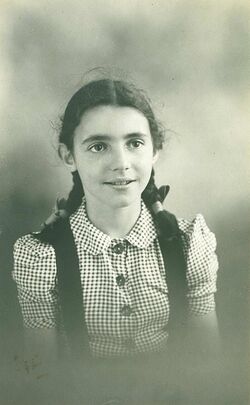Steve Shirley / Vera Buchthal (F / Germany, 1933), Holocaust survivor
Steve Shirley / Vera Buchthal (F / Germany, 1933), Holocaust survivor
Renate Buchthal (F / Germany, 1929), Holocaust survivor
- KEYWORDS : <Refugees> <Kindertransport> <England>
Biography
Steve Shirley was born as Vera Buchthal to Arnold Buchthal, a judge in Dortmund who was Jewish and who lost his post to the Nazi regime,[4] and a non-Jewish Viennese mother. In July 1939 Shirley arrived, at the age of five together with her nine-year-old sister Renate, in Britain as a Kindertransport child refugee.[4][5] She was placed in the care of foster parents living in the Midlands town of Sutton Coldfield.[1] She was later re-united with her biological parents, but said she "never really bonded with them".
The Guardian (6 July 2019)
Shirley was born in 1933 in Dortmund in Germany to an affluent family; her father, a judge, was a German Jew, her mother was a non-Jew from Vienna. But in the year she was born her father lost his job. Money became short and the family relocated to Austria.
“I was very protected from everything but I was unsettled by the tension around us. For example, we always went to meet my sister from school, because children had started throwing stones.”
In the face of the growing Nazi threat, her father was the first to leave Vienna, crossing mountains on foot to neutral Switzerland and then to England, where he was interned. In the summer of 1939, Shirley’s mother took the heartbreaking decision to put her daughters on a Kindertransport train to London.
“It was a trainload of 1,000 children. At the station, we were surrounded by weeping parents. My mother gave us each a beautifully wrapped present with strict instructions not to open it until the train had left. I remember wanting the train to move so I could see what was inside. My mother held it together but she didn’t really expect to see us again.”
At my core I’m a crusader, and philanthropy follows from that. It’s not a question of duty – I get so much pleasure from it Dame 'Steve' Shirley On arrival in London, the sisters were sent to live with foster parents in the Midlands. Shirley adapted quickly, forming strong ties with her new family and learning English.
Her mother later made it to England by “bribing her way across Europe, including the fur coat off her back”. When she arrived, she was offered the same choice as other adult female refugees: domestic service or working in the fields. The woman who was accustomed to employing servants became one herself.
It was some years before the family was reunited. “I never bonded with my parents again,” said Shirley. “They were fine people but my bond was with my foster parents. I was a young English woman, and my whole culture had become English. I refused to speak German – and now it’s completely gone.”
But the fracturing of her birth family left a deep mark. “I finished up pretty disturbed. It took six years of deep analysis to get over my feeling of not belonging, of being rejected, my problems of identity. When I go to Jewish events now, I envy the family focus, families holding together, but I don’t feel that’s me. I’m the child of my foster parents in all but birth.”
After leaving school, Shirley worked at the Post Office research station, helping to build and programme early computers, and later at another company where she became “fed up with all the sexism, where my suggestions were ignored but when a man made the same point five minutes later it would be ‘oh yes, we must do that’.”
She started her own software company with £6, working from home. “I thought the world would beat a path to my door, but nothing happened. My husband thought that perhaps my double feminine name – Stephanie and Shirley – was a problem, so I began signing my letters ‘Steve Shirley’. That change got me through the door, it gave me a chance.” She has been known as Steve ever since.
As the company grew, Shirley hired women to work for her. “Of my first 300 staff, only three were men. Then the Sex Discrimination Act came in, and I couldn’t do that any more.”
But the bigger the company got, the less Shirley enjoyed running it. She retired at 60, and has devoted the past 25 years to philanthropy and the arts. Much of her charitable work has focused on autism, a condition she experienced close up through her late son, Giles, who was autistic.
“At core I’m a crusader, and philanthropy follows from that. It’s not a question of duty – I get so much pleasure from it,” she said.
She strongly believes the UK government should do more to alleviate the current refugee crisis. “How did I find a home? Someone put an ad in the paper saying ‘two sisters seeking a home’. We should be doing something like that for today’s refugees. Most people are willing to help.”
